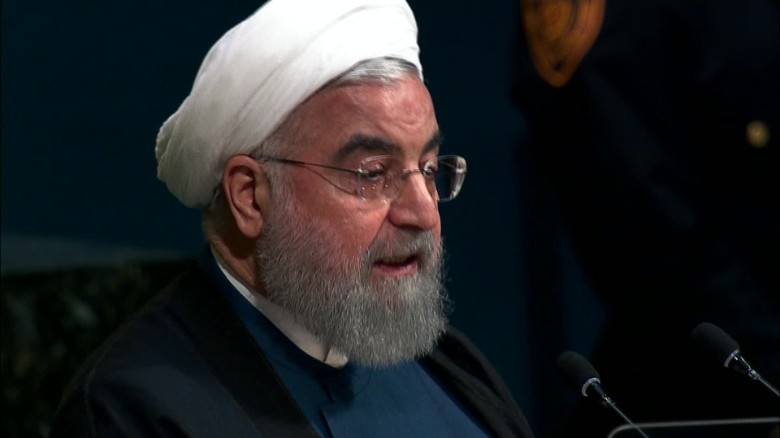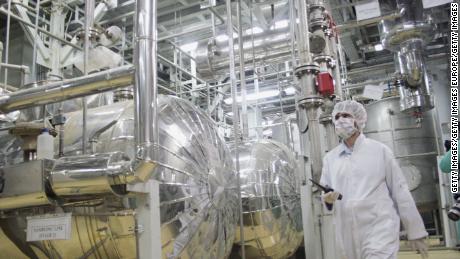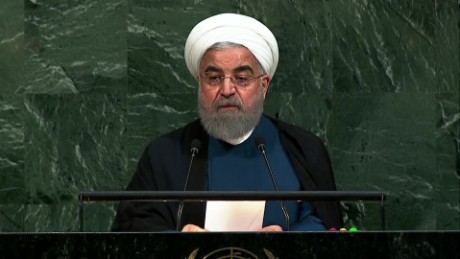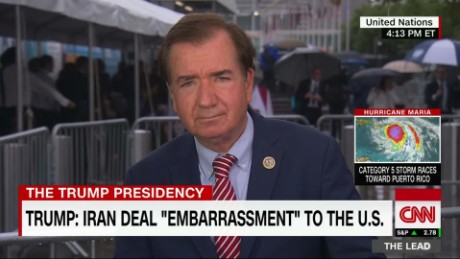Story highlights
- The diplomats said the deal is in the national security interests of their countries, the Middle East and the world
- Under US law, the President has to certify to Congress every 90 days that Iran is complying with the deal
Washington (CNN)European ambassadors to the US mounted a united defense of the Iran nuclear deal as Washington signals it may walk away from the pact.
Envoys from the European Union, Germany, France and Britain laid out their arguments, returning frequently to their central point that the deal is working and Iran is complying with the agreement reached in July 2015 and implemented in January 2016.
The diplomats said the deal is in the national security interests of their countries, the Middle East and the world. They said a decision to walk away would undermine Western credibility, particularly with North Korea. And while they're happy to discuss Iran's behavior outside of the nuclear deal, they said the pact itself is not open for renegotiation.
"We don't think it will be possible to renegotiate" the Joint Comprehensive Plan of Action, said German Ambassador Peter Wittig, who added that his country saw no practical way to do so.
Other parties to the deal are adamant that it won't happen, French Ambassador Gerard Araud told the audience at the Atlantic Council event where the envoys spoke. At the UN General Assembly, during a meeting last week of all parties to JCPOA, he said, "there was a very clear message" from Iran, China and Russia "saying no way, there won't be any re-opening of the agreement, the agreement is working as it is," Araud said.
A signature achievement of the Obama administration, the international accord has been in President Donald Trump's crosshairs since he was on the campaign trail. His administration has been conducting a review of Iran policy and he has hinted that he will take some sort of action in mid-October.
Under US law, the President has to certify to Congress every 90 days that Iran is complying with the deal. Trump has repeatedly hinted that he wants to ditch the agreement, most recently in his speech before the United Nations General Assembly last week.
"We cannot let a murderous regime continue these destabilizing activities while building dangerous missiles, and we cannot abide by an agreement if it provides cover for the eventual construction of a nuclear program," Trump told the Assembly.
He went on to declare that the "Iran deal was one of the worst and most one-sided transactions the United States has ever entered into.┬ĀFrankly, that deal is an embarrassment to the United States."
The President and administration officials say the deal doesn't address Iran's missile development or its activities in the region, including support for Houthi rebels in Yemen and for the regime of Syria's Bashar al-Assad. And they object in particular to parts of the deal governing uranium enrichment that eventually expire under a "sunset clause."
That was deliberate, said Araud said on Monday. The deal was so "technical, so complicated ... we didn't want to be dragged down into a quid pro quo on other issues," Araud said. "Nothing in the agreement is preventing us from facing the challenges raised by Iran on other issues."
EU ambassador David O'Sullivan said that none of the issues the Trump administration is concerned about would be easier to deal with if the US abandons the nuclear pact. "I can think of no regional issue that would not be even more difficult to handle if Iran possessed nuclear weapons," O'Sullivan said. "This is one of the most comprehensive non-proliferation agreements every negotiated."
Stuart Eizenstat, chairman of the Atlantic Council's Iran Advisory Board for the Future of Iran Initiative, captured some of the unspoken feeling on the panel when he said at the opening of the event that "it now appears that Washington, rather than Iran, may be a bigger threat to the JCPOA."
Wittig said that engaging with Iran after the lifting of sanctions is "a legitimate and desirable goal" of the agreement because trade and regular contact "potentially binds us closer together" and could eventually change Iranian behavior. With "80 million people, you can't just wish it away," he said. "We want this Iran to gradually move to our world view."
He urged the Trump administration to consider the broader context of their actions. "What kind of signal would it send to North Korea," he asked. "It would send a signal that diplomacy is not reliable ... that would affect our credibility in the West when we're not honoring an agreement that Iran has not violated."
British Ambassador Kim Darroch said that UK Prime Minister Theresa May spent 50 minutes meeting with Trump during the UN gathering, talking about ways to address Iran's non-nuclear behavior that so concerns the President.
Like the other ambassadors, Darroch said his country shares concerns about Iran's missile development and its backing for groups such as Hezbollah and Hamas.
Darroch said May told Trump that the UK supports the deal because "it's about our national security, we think we are more secure because of the deal," and he said she presented to Trump, Vice President Mike Pence and Secretary of State Rex Tillerson "ways we could push back against Iranian activities in the region."
The UK envoy added that they also discussed "starting, at some point, within the context of this agreement, talks with the Iranians on the sunset clause and what comes next."
Darroch said he thought the administration is making headway in raising its concerns about Tehran. It has "changed the climate already on Iran," Darroch said, "so it's succeeding, we would say let's carry on with that, let's intensify those discussions, but let's keep the JCPOA."









